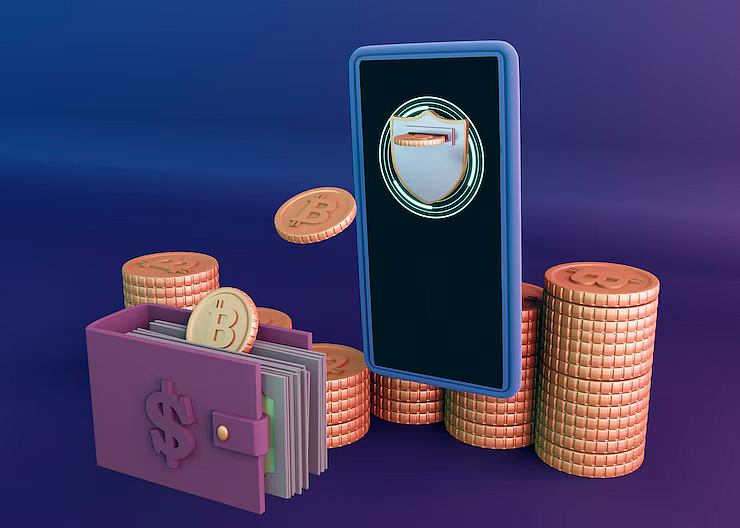A crypto wallet is your gateway to the digital economy. It's a tool that lets you securely store, send, and receive digital assets like Bitcoin, Ethereum, and NFTs.
But here’s the most important thing to understand: a crypto wallet doesn’t hold your coins like a real wallet holds cash. Instead, it holds two critical pieces of information:
Your Public Key: This is like your bank account number. You can share it with anyone to receive crypto.
Your Private Key: This is like your secret password and PIN combined. It gives you—and only you—access to your funds. Never share this with anyone.
Read More About: The Future of Crypto Wallet Technology: Evolving Trust in the Digital Economy
The Main Types of Crypto Wallets: Hot vs. Cold
All crypto wallets fall into two main categories based on whether they are connected to the internet: Hot Wallets and Cold Wallets.
1. Hot Wallets (Internet-Connected)
A hot wallet is any wallet that is connected to the internet. This includes mobile apps, desktop software, and web browser extensions.
Pros: Very convenient for frequent trading and daily transactions. Easy to set up and use.
Cons: More vulnerable to online threats like hacking and malware.
Best for: Small amounts of cryptocurrency, active traders, and beginners making their first transactions.
Examples: MetaMask, Trust Wallet, Exodus.
2. Cold Wallets (Offline)
A cold wallet stores your private keys completely offline. These are typically small physical devices (hardware wallets) or pieces of paper.
Pros: The highest level of security. Immune to online hacking attempts.
Cons: Less convenient for quick or frequent transactions. Can be lost or physically damaged.
Best for: Storing large amounts of crypto, long-term holding ("HODLing").
Examples: Ledger, Trezor (these are hardware wallets).
Who Controls Your Keys? Custodial vs. Non-Custodial
Custodial Wallets: A third party (like the exchange you bought crypto on) holds the private keys for you. It's convenient but means you are trusting them with your funds.
Non-Custodial Wallets: You hold your own private keys. This gives you full control ("not your keys, not your crypto") but makes you 100% responsible for their safety.
Which Wallet Should You Get?
The best wallet depends on your goals.
If you are a Beginner or Frequent Trader: Start with a reputable non-custodial hot wallet. A mobile wallet like Trust Wallet or a browser extension like MetaMask is perfect for managing small amounts and interacting with crypto apps.
If you are a Long-Term Investor (HODLer): Security is paramount. You must use a cold wallet. A hardware wallet from Ledger or Trezor is the industry standard for protecting significant investments from online threats.
If you are an NFT Collector or DeFi User: You need a versatile hot wallet. MetaMask is the undisputed leader, connecting seamlessly to nearly every NFT marketplace and DeFi platform.
Your Essential Security Checklist
In crypto, you are your own bank. Security is 100% your responsibility.
Guard Your Seed Phrase. When you set up a non-custodial wallet, you will get a 12 or 24-word "seed phrase." This is the master key to your entire wallet.
DO: Write it down on paper and store it in a secure, offline location (like a safe).
NEVER: Store it as a screenshot, in a text file, on a cloud drive, or share it with anyone.
Use a Hardware Wallet for Serious Money. For any amount of crypto you cannot afford to lose, a hardware wallet is not optional—it is essential.
Download Only from Official Sources. Always double-check the URL. Use links from the official company website or official app stores. Scammers create fake apps and websites to steal your funds.
Start with a Small Test Transaction. Before sending a large amount of crypto, send a small test amount first to ensure you have the correct address and that everything is working as expected.
Frequently Asked Questions About Crypto Wallets
1. Can a crypto wallet be hacked?
Yes, but the risk depends on the wallet type. Hot wallets, which are connected to the internet, are more vulnerable to online threats like malware and phishing scams. Cold wallets (hardware wallets) are considered much safer because they store your keys offline, making them immune to online hacking.
2. What happens if I lose my phone or hardware wallet?
Your crypto is still safe as long as you have your recovery seed phrase (the 12-24 word phrase you were given at setup). You can use this phrase to restore your wallet and access your funds on a new device. This is why keeping your seed phrase secure and offline is the most important rule of crypto.
3. Are crypto wallets free?
Most software (hot) wallets like MetaMask and Trust Wallet are free to download and use. Hardware (cold) wallets are physical devices that you must purchase, typically costing between $60 and $200. While the wallet software may be free, you will always have to pay network fees (or "gas fees") for every transaction you make on the blockchain.
4. How do I cash out my crypto from a wallet?
Most non-custodial wallets do not allow you to convert crypto directly into cash (like USD or EUR). To cash out, you must first send your crypto from your wallet to an account on a centralized cryptocurrency exchange (e.g., Coinbase, Kraken, Binance). From there, you can sell it for cash and withdraw the money to your linked bank account.
Final Thoughts
Crypto wallets are more than digital lockers; they are essential instruments for participating in the decentralized economy. Choosing the right wallet depends on your goals, whether you’re a casual investor, an NFT enthusiast, a DeFi explorer, or a long-term HODLer.
Understanding how wallets work, hot and cold storage distinctions, and the utmost importance of private key management is vital to the security of your digital assets. As the ecosystem matures, wallets will continue to be at the center while shaping the destiny of financial interaction itself.





















